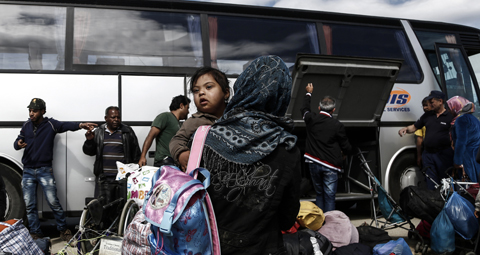September 2 | ![]() 0 COMMENTS
0 COMMENTS ![]() print
print

Light of hope will guide us in darkness
Faith in Jesus helps us to move past our anxieties and fears and move towards improved possibilities
By Emily Murtagh
WE live in a world where hope does not seem to flow easily. We wake to stories of more deaths in Syria, while the run up to the US elections is playing out like a bad dream.
One in every 400 children in the world is a refugee—that figure is impossible to comprehend. Even with the knowledge of global injustices and suffering, it may be that your most overwhelmingly fearful situations live much closer; they are inside your heart and dwell in your home.
They are your sick father, the ex-girlfriend you wish things could work out with. They are the killing pains on your insides that keep you from getting out of bed in the morning—the doctors call it depression but you wish it could have a more dangerous name.
Given what we know and experience, how can we hope? My conviction can be summed up as this: “Hope begins at the moment you decide it doesn’t have to be this way anymore.”
I guess this is the summation of what Jesus came to say, the purpose of his life, death and resurrection. He came to announce to the world that in both the sphere of private pain and the structures of public injustice, it does not have to be this way.
The Kingdom of God—the one he demonstrated, the one for which he died so it could be in motion among us—exemplifies a vision for a better world. The hope presented is not a flimsy one and the language used around hope in the Bible is consistently steady and strong: “We have this hope as an anchor to the soul, firm and secure.
“And this I call to mind and therefore I have hope, the steadfast love of the Lord never ceases.
“Therefore my heart was glad and my tongue rejoiced; my flesh also will dwell in hope.”
I imagine all the anxieties within us being solidified and transformed by this hope into something that brings stability and security. We become grounded in something that cannot be swayed, that will not be destroyed.
Anxiety seems to be one of the strongest forces today, the undercurrent of our actions and our inaction, the powerful monster that feeds on our dreams—quickly if we let it.
It can be the most paralysing force of all because it robs us of our instinct, of the feeling of a decision well made. Anxiety makes every decision seem so vast and the consequences so frightening that it can be easy to feel stuck.
Søren Kierkegaard, the Danish philosopher and theologian, viewed anxiety as the natural response to the dizziness of freedom, to the seemingly infinite array of choices we have to make every day.
Anxiety is somewhat of a by-product of freedom and possibility. The more we reflect on the huge life we are part of, shared with 7.125 billion people, the more we realise the magnitude of our possibilities and choices.
How do we live in a way that shares this life with others, who are created with the same array of emotions and infinite possibilities?
The good news is that we were not made to be left in anxiety. Through faith, we are pointed in the direction of our best possibilities and equipped by the Holy Spirit to move towards reaching them.
Anxiety exists only in a world where there is a possibility of more than one outcome, which is a hopeful thought—that things can be different.
St Augustine said something perfect about hope: “Hope has two beautiful daughters; their names are Anger and Courage. Anger at the way things are and Courage to see that they do not remain as they are.”
To protest against suffering, to be angry, to look for another way of being, this is the example left by Jesus. It is, in some ways, the ultimate act of rebellion, the uprising of hope against the darkness that can seem to pervade.
We have choices, so perhaps it is your time to make one. Take that fear and anxiety, feel it and let it burn. Protest against it and make it into something beautiful.
Hope may not always be an entirely pleasant feeling. It can be difficult because if it begins at the moment you decide things should change, then you have to do things differently.
Hope is a stepping stone to faith, and from faith to obedience, to a way of life that carries hope into the life of others—hopes for those who are not strong enough to hope for themselves.
We can hope with peace in our hearts because we know that we do not go alone, but rather with the power of God dwelling within us. So smile at strangers, write a letter to your best friend, listen to that intense person on the bus and let someone know you are not doing too well—let them replenish your hope stocks.
Go to Calais to help in the refugee camps, give up your existing life in exchange for a new one—you already know what to do to make that hope feel a little more concrete.
The dizziness of freedom and its abuse can leave us feeling hopeless but how beautiful it can be when we point our freedoms towards our best possibilities and together we all move forward.











